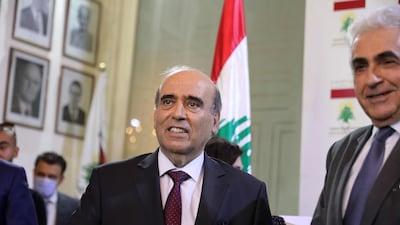Lebanese President Michel Aoun has appointed his diplomatic adviser Charbel Wehbi as foreign minister after the sudden resignation of Nassif Hitti.
Mr Wehbi, 67, was a diplomat for 42 years before retiring in 2017 to advise Mr Aoun. He served as Lebanon’s ambassador to France, consul general in Los Angeles and was most recently the country’s representative to Venezuela between 2007 and 2012.
The unusual move by the president, signed off by the prime minister, to issue a decree directly appointing the new minister – and to place a close aide in the position – raises questions over the apparent independence of the government.
Formed in January by Prime Minister Hassan Diab, the current administration is made up largely of technocrats without direct political affiliation. However, critics point out that all 20 members were nominated by many of the political factions in parliament and many have held roles in parties before.
While there is precedent for a decree to appoint a minister, it is a “serious challenge to parliamentary democracy and the Lebanese consociationalism arrangement that was formulated in the 1989 Taif agreement,” said Imad Salamey, associate professor of Middle East political affairs at the Lebanese American University.
The Taif Accord laid the foundation to end Lebanon’s 15-year civil war and re-balanced the share of power between the numerous Lebanese sects. It also strengthened the role of the prime minister and of parliament at the expense of the president.
“There is no constitutional text that provides the president or the prime minister with such a power. On the contrary, the constitution provides Parliament with the power of approving government line up and executing oversight over the work of individual ministers or the council of ministers,” Mr Salamey said.
He added that the move undermines the independence of the government.
“Of course, this approach in replacing the FM lacks transparency and accountability, further politicising the executive appointments and undermining parliamentary oversight,” he said.
Mr Hitti resigned on Monday and criticised the lack of progress in passing urgent reforms to begin fixing the country’s myriad crises from the worst financial meltdown in its history to piling rubbish, mounting power cuts, spiking unemployment and rising poverty.
The new minister has said he will seek good relations with all friendly countries and did not rule out official visits to Syria – a contentious issue for past governments split between opponents of Damascus and its allies.
"We should be open to visit any Arab country," Mr Wehbi said on the issue. Past Lebanese governments have pledged a policy of non-interference in regional affairs and ministers have not visited Damascus in an official capacity since the start of the war in 2011.
On the issue of US sanctions on Hezbollah members and finances of the group, he said "These issues can be discussed with the concerned parties."












